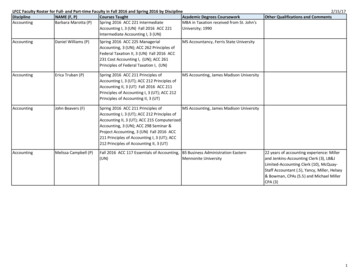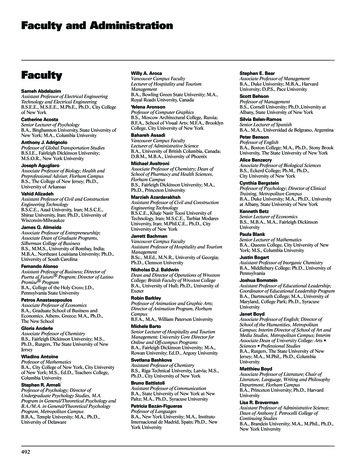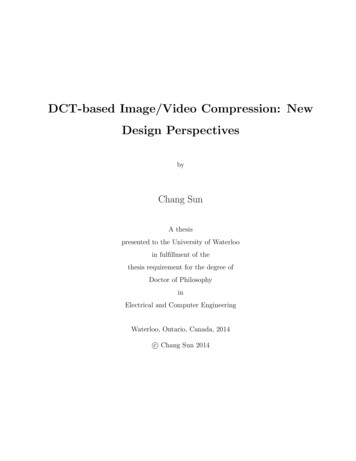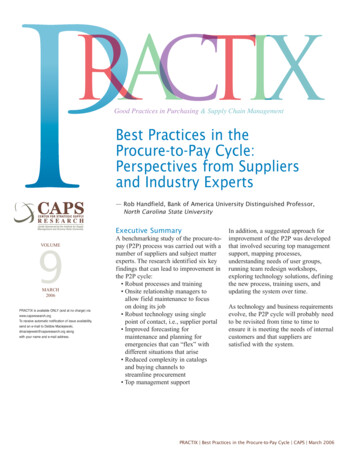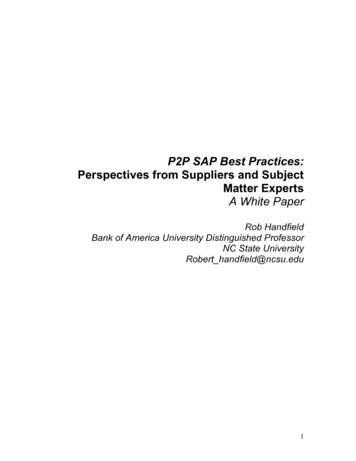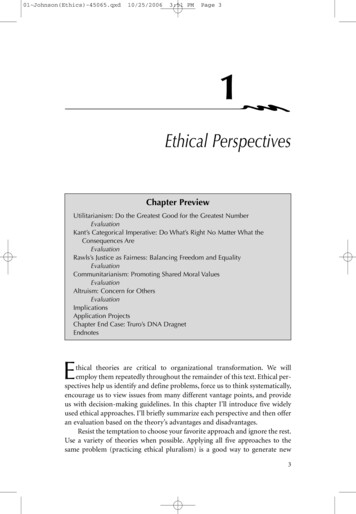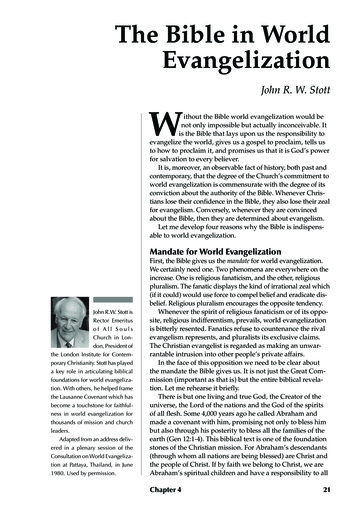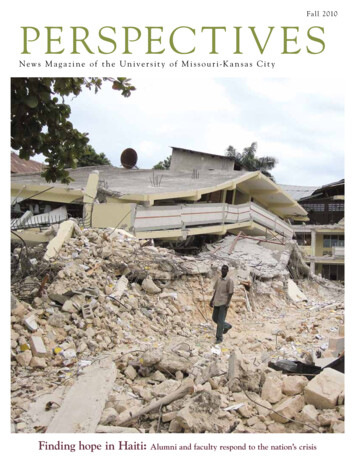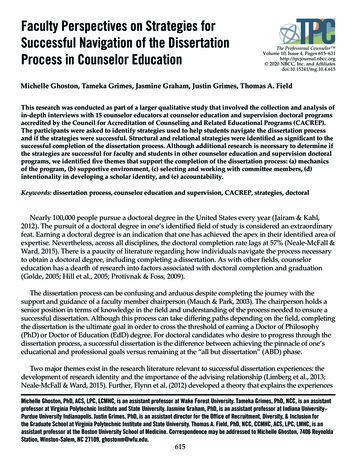
Transcription
Faculty Perspectives on Strategies forSuccessful Navigation of the DissertationProcess in Counselor EducationThe Professional Counselor Volume 10, Issue 4, Pages 615–631http://tpcjournal.nbcc.org 2020 NBCC, Inc. and Affiliatesdoi:10.15241/mg.10.4.615Michelle Ghoston, Tameka Grimes, Jasmine Graham, Justin Grimes, Thomas A. FieldThis research was conducted as part of a larger qualitative study that involved the collection and analysis ofin-depth interviews with 15 counselor educators at counselor education and supervision doctoral programsaccredited by the Council for Accreditation of Counseling and Related Educational Programs (CACREP).The participants were asked to identify strategies used to help students navigate the dissertation processand if the strategies were successful. Structural and relational strategies were identified as significant to thesuccessful completion of the dissertation process. Although additional research is necessary to determine ifthe strategies are successful for faculty and students in other counselor education and supervision doctoralprograms, we identified five themes that support the completion of the dissertation process: (a) mechanicsof the program, (b) supportive environment, (c) selecting and working with committee members, (d)intentionality in developing a scholar identity, and (e) accountability.Keywords: dissertation process, counselor education and supervision, CACREP, strategies, doctoralNearly 100,000 people pursue a doctoral degree in the United States every year (Jairam & Kahl,2012). The pursuit of a doctoral degree in one’s identified field of study is considered an extraordinaryfeat. Earning a doctoral degree is an indication that one has achieved the apex in their identified area ofexpertise. Nevertheless, across all disciplines, the doctoral completion rate lags at 57% (Neale-McFall &Ward, 2015). There is a paucity of literature regarding how individuals navigate the process necessaryto obtain a doctoral degree, including completing a dissertation. As with other fields, counseloreducation has a dearth of research into factors associated with doctoral completion and graduation(Golde, 2005; Hill et al., 2005; Protivnak & Foss, 2009).The dissertation process can be confusing and arduous despite completing the journey with thesupport and guidance of a faculty member chairperson (Mauch & Park, 2003). The chairperson holds asenior position in terms of knowledge in the field and understanding of the process needed to ensure asuccessful dissertation. Although this process can take differing paths depending on the field, completingthe dissertation is the ultimate goal in order to cross the threshold of earning a Doctor of Philosophy(PhD) or Doctor of Education (EdD) degree. For doctoral candidates who desire to progress through thedissertation process, a successful dissertation is the difference between achieving the pinnacle of one’seducational and professional goals versus remaining at the “all but dissertation” (ABD) phase.Two major themes exist in the research literature relevant to successful dissertation experiences: thedevelopment of research identity and the importance of the advising relationship (Limberg et al., 2013;Neale-McFall & Ward, 2015). Further, Flynn et al. (2012) developed a theory that explains the experiencesMichelle Ghoston, PhD, ACS, LPC, LCMHC, is an assistant professor at Wake Forest University. Tameka Grimes, PhD, NCC, is an assistantprofessor at Virginia Polytechnic Institute and State University. Jasmine Graham, PhD, is an assistant professor at Indiana University–Purdue University Indianapolis. Justin Grimes, PhD, is an assistant director for the Office of Recruitment, Diversity, & Inclusion forthe Graduate School at Virginia Polytechnic Institute and State University. Thomas A. Field, PhD, NCC, CCMHC, ACS, LPC, LMHC, is anassistant professor at the Boston University School of Medicine. Correspondence may be addressed to Michelle Ghoston, 7406 ReynoldaStation, Winston-Salem, NC 27109, ghostonm@wfu.edu.615
The Professional Counselor Volume 10, Issue 4of counseling professionals during the dissertation phase. Their specific theory of initiation, management,and completion of the dissertation includes three elements: relational factors (i.e., personal relationshipsand friends), professional factors (i.e., career and professional identity), and internal factors (i.e., withinthe person). These themes are explored to position this study in the context of what is currently knownabout high-quality doctoral dissertation advising from the perspective of the chairperson, which furthersupports the theory of initiation, management, and completion of the dissertation process.Research Identity DevelopmentThe experiences and challenges associated with the pursuit of a doctoral degree in counseloreducation and supervision (CES) have received increased focus within scholarly literature (Hinkleet al., 2014; Hoskins & Goldberg, 2005; Lamar & Helm, 2017; Neale-McFall & Ward, 2015). Criticalto the pursuit of a doctoral degree is the scholarly identity forged among students during thedissertation process (Dollarhide et al., 2013; Limberg et al., 2013). For some doctoral students, thepursuit of a doctoral degree in CES is connected to research interests and goals developed duringpost–master’s degree experiences (Farmer et al., 2017; Hinkle et al., 2014). Upon entering a doctoralprogram, students often maintain those initial interests and goals or adopt new interests that alignwith expanded goals and/or faculty and program expectations (Lei, 2009). According to Hoskins andGoldberg (2005), congruence between students’ goals, faculty expectations, and doctoral programgoals is a key determinant of student attrition and persistence in CES doctoral programs.Faculty have an important role in the development of a scholar and research identity amongCES doctoral students (Dollarhide et al., 2013; Limberg et al., 2013). Relationships with mentors andfaculty contribute to doctoral students’ professional identity development as counselor educators(Limberg et al., 2013). To that end, faculty support is important in doctoral students’ research identitydevelopment (Dollarhide et al., 2013; Lamar and Helm, 2017). Nevertheless, gaps persist within thestudy of research identity development in CES. Although there has been examination into students’rationales for the pursuit of graduate education in professional counseling and how this pursuitinforms the development of one’s professional identity (Limberg et al., 2013), less is known aboutthe experiences of doctoral students in CES (Dollarhide et al., 2013). As a result, little is known aboutthe professional, research, and scholar identity development of doctoral students in CES and howdoctoral study impacts the aforementioned areas of identity development (Dollarhide et al., 2013).Chairpersons provide research-related ideas, strategies, and requirements useful to the developmentof students’ research identity. Examples of ideas and strategies include students seeing themselves asknowledge creators, the ability to identify gaps in literature, and a focus on completing a study that canbe done in a reasonable time (Dollarhide et al., 2013). The dissertation stage is a place where studentsunderstand and accept their responsibility for creating new knowledge in the field. Yet, as facultypostulate these ideas and disseminate their recommendations to doctoral candidates, there may be adisconnect between seeing one’s role as a knowledge creator (student) and gatekeeper (faculty).As gatekeepers for their doctoral candidates, faculty create barriers and maintain rules aroundwhat they deem is research, a structure for how to conduct research, and how the research willimpact the field of counselor education. Researchers have yet to explore how students receive thisfeedback. Having their needs considered and receiving consistent feedback have been outlinedas helpful with doctoral students understanding how gatekeeping supports them throughout thedissertation process (Dollarhide et al., 2013; Hilliard, 2013).616
The Professional Counselor Volume 10, Issue 4Approaches to AdvisingThe dissertation chairperson has a number of roles to help a doctoral candidate be successful.According to Garcia et al., (1988), a lack of chairperson supervision or mentorship contributes todelayed completion or non-completion of the dissertation process. Given the importance of thedissertation chairperson, understanding chairpersons’ approaches to advising and feedback iscritical. Previous literature indicates three important elements of chairperson–student interactions inthe dissertation process: (a) transparent and supportive feedback, (b) collaborative interactions, and(c) established communication expectations. These will be discussed below.Transparent and Supportive FeedbackHilliard (2013) provided a number of recommendations regarding transparent and supportivefeedback to doctoral students. First, according to Hilliard, because chairpersons hold a majorresponsibility to ensure the student receives specific feedback for accepting improvements from othercommittee members, it is incumbent upon chairpersons to maintain positivity and professionalismwhen working with students. Second, chairpersons should demonstrate an ability to understandstudents’ needs in the context of their current dissertation stage. Lastly, Hilliard advises chairpersonsto make consistent efforts to provide appropriate and useful feedback to students that informs themof their progress toward dissertation completion.Nevertheless, there are a number of additional challenges in addressing feedback, including thestrategies and ideas provided through feedback. Giving and receiving feedback can be challenging.Questions regarding when, where, and how feedback should be given further complicates the feedbackprocess (Purgason et al., 2016). The complication in the feedback process occurs largely because bothparties, chairperson and doctoral candidate, have a responsibility to provide and share feedbackand oftentimes expectations are not established. However, in general, the chairperson has the addedresponsibility of initially broaching feedback, as well as establishing norms and expectations aroundhow and when feedback can occur (Purgason et al, 2016).Finally, faculty provide critical feedback in a supportive manner. Learning is most likely to occur whenfeedback is critical yet supportive, provided in a timely manner, and given with time for the advisee toreceive and respond (Dollarhide et al., 2013; Idrus et al., 2018). The challenge faculty members face infollowing this structure of providing and receiving feedback is that it can create growth but may lead tofeelings of frustration experienced by both individuals (Idrus et al., 2018; Waring, 2017). A response toaddress this challenge is to consider the whole person (i.e., professional identity and social and emotionalwellness beyond academics) and educate students on the usefulness of giving and receiving feedback(Idrus et al., 2018).Collaborative InteractionsNeale-McFall and Ward (2015) found that CES doctoral students were most satisfied when workingwith chairpersons who they perceived to be collaborative. This was a significant contributor todoctoral student satisfaction with the dissertation process. Additionally, Hilliard (2013) recommendedthat chairpersons work collaboratively by utilizing dissertation committee members’ expertise.Established Communication ExpectationsHilliard (2013) noted that students are more likely to move successfully through the dissertationprocess if there are clear expectations communicated, written, and agreed upon with the faculty.Expectations that include each of these elements provide a foundation for the way feedback will begiven and received. Moreover, clear communication expectations can help the doctoral candidate with617
The Professional Counselor Volume 10, Issue 4productivity and keep both parties accountable throughout the dissertation process (Hilliard, 2013). Clearexpectations provide a structure for the dissertation process and help candidates efficiently move throughthis phase of their doctoral journey (Flynn et al., 2012; Hilliard, 2013). In establishing these expectations,department and program faculty share the roles of the dissertation chairperson as coach and supporterof the doctoral student. Faculty and students have named other essential parts of successfully advancingthrough the process, including the degree of involvement, having systems of support, mentoring, andfitting within the departmental culture (Dollarhide et al., 2013). Despite naming these essential parts forsuccess, little is known about how these factors impact successful navigation of the dissertation process.Purpose of the StudyPrevious research with current and former doctoral students has found that students see a numberof criteria as vital to their success in the doctoral process. These criteria include professionalism, clearexpectations, and consistent feedback from their advisor, as well as a collaborative approach to thedissertation and mentoring processes (Neale-McFall & Ward, 2015; Purgason et al., 2016; Sinady etal., 2009). Although these studies provide a detailed picture from the students’ perspective, limitedresearch exists regarding the topic of successful dissertation advising from the perspective of facultyadvisors. Faculty advisors play an integral role in the success of doctoral students as they progressthrough the dissertation process (Dollarhide et al., 2013; Limberg et al., 2013). To address this gap inknowledge, this research explored the following question: From a faculty member’s perspective, whatstrategies help students navigate the dissertation process, and how successful are those strategies?A qualitative design was selected to elicit an in-depth analysis of the experiences of faculty memberssupporting students in the dissertation process, affording the research team the opportunity to valueall responses regardless of the frequency or number of responses (Lincoln & Guba, 2013).MethodsThis study was a part of a larger qualitative research study that was led by the fifth author. Thatlarger study utilized a basic qualitative research design, with the primary goal of collecting andanalyzing qualitative data, and employed the constant comparative method to collect, code, andcategorize the data (Corbin & Strauss, 2015; Merriam & Tisdell, 2016). The data was collected using indepth qualitative semi-structured interviews (see Appendix) with 15 faculty members in CES doctoralprograms. Data collection continued until saturation was achieved and no new ideas were presented.Saturation was determined when the same themes were repeated by multiple participants. Participantsresponded to interview questions regarding issues pertinent to doctoral CES programs, specificallythe components of high-quality programs, strategies to recruit and retain underrepresented students,strategies for working with administrators, and strategies for successful dissertation advising. In thisstudy, a research team comprised of the first four authors analyzed and coded interview data pertinentto the research question: From a faculty member’s perspective, what strategies help students navigatethe dissertation process, and how successful are those strategies? The goal of employing this researchquestion was to identify successful strategies utilized by faculty to support doctoral students incompleting the dissertation process and to understand the effectiveness of these strategies.ParticipantsParticipants in this study were full-time core faculty members in CES doctoral programs accreditedby the Council for the Accreditation of Counseling and Related Educational Programs (CACREP).The participants worked in CACREP-accredited CES programs that had doctoral-level students. Allparticipants had experience serving as a dissertation chairperson. Maximum variation sampling—thatis, deliberately selecting a wide range of extremes from the population—was used to select participants618
The Professional Counselor Volume 10, Issue 4to increase the likelihood of a diverse and representative sample (Merriam & Tisdell, 2016). Participantswere selected one at a time to ensure adequate variation of the selection criteria. The selection criteriaincluded: a) gender self-identification, b) racial and ethnic self-identification, c) Carnegie classification ofthe university where the participant was currently employed (The Carnegie Classification of Institutionsof Higher Education, 2019), d) length of time working in doctoral-level counselor education programs,e) the method used to deliver the counselor education program where the participant was currentlyworking (e.g., in person, online), and f) the region of the counselor education program where theparticipant was currently working. Based on previous research (Cartwright et al., 2018; Hill et al., 2005;Lambie et al., 2014; Smith et al., 2015), each of the noted criterion were believed to have some impacton the participants’ perspectives and, ultimately, their responses. Data saturation occurred after 15interviews. A constant comparative method was utilized to assure saturation.All 15 participants interviewed for this study taught in separate and unique CES programs. Noprogram was represented by more than one participant. The demographics of the participants includedeight self-identified males (53.3%) and seven self-identified females (46.7%). No participants identifiedas non-binary or transgender. All but one of the participants identified as heterosexual (n 14, 93.3%);the one remaining participant identified as bisexual (6.7%). Racial and ethnic representation, also selfreported, was largely White (n 11, 73.3%). Other racial groups represented included African American(n 1, 6.7%), Asian (n 1, 6.7%), Latinx (n 1, 6.7%), and multiracial/multiethnic (n 1, 6.7%). Accordingto the 2017 CACREP Vital Statistics report, 71.38% of counselor education faculty in CACREP-accreditedprograms are White (CACREP, 2018). Thus, our sample was representative of the CES profession as itrelates to the cultural identification of being White.The participants averaged 19.7 years (SD 9.0 years) of experience as full-time faculty members.Most of the participants’ years as faculty members were spent at the doctoral level in CES programs(M 17.3 years, SD 9.2 years, Mdn 16 years). The number of years as a faculty member rangedfrom 3 to 33 years.ProcedureAfter receiving approval from the last author’s IRB, a database of doctoral-level counselor educatorcontacts who worked at the then 85 programs accredited by CACREP was created (CACREP, n.d.).Thirty-four faculty responded to the request to participate. Of the 34 respondents, 15 respondents (41%response rate) were selected to participate in the study. The process of selecting and interviewing the15 participants was scheduled and conducted by the fifth author. The selection of the 15 participantswas done using maximum variation sampling (Merriam & Tisdell, 2016). The interviews lasted forapproximately 60 minutes and were recorded with the consent of each participant via the Zoom onlineformat. One interview was completed during a professional conference and was recorded with aSony digital audio recorder. Participants were assigned an alphabetical identifier to protect individualidentities during the data analysis process. This step allowed all researchers to be blinded to theparticipants’ identities except for the fifth author. The fifth author did not participate in the coding andanalysis process in order to enhance participant anonymity and reduce the potential for bias duringthe data analysis process.Interview ProtocolThe interview question analyzed for this study was “How have you helped students to successfullynavigate the dissertation process?” To start each in
Upon entering a doctoral program, students often maintain those initial interests and goals or adopt new interests that align with expanded goals and/or faculty and program expectations (Lei, 2009). According to Hoskins and Goldberg (2005), congruence between students’ goals, fa
